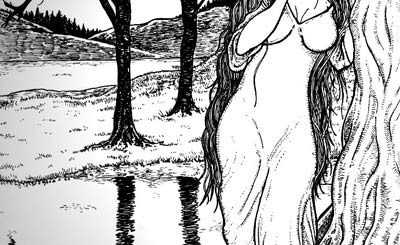Robert Johnson
The myth of Robert Johnson is an enduring American blues legacy rooted in the hoodoo culture of the Deep South. The basic myth is that Robert sold his sold to the Devil in exchange for his supernatural guitar prowess. (Part of this legend about the Crossroads is examined here). The mythology has become entwined with the early blues culture and is linked lyrically to many songs of the blues idiom. This folklore of charms and superstitions, such as the ‘black cat bone’ and ‘Mojo Hand’ were believed to have some potency to effect everyday life. Robert’s life itself is shrouded in mystery and his early death probably paved the way for him to become the focus of the Crossroads mythology.
Robert Johnson was born an illegitimate son of Julia Johnson on the 8th of May 1911 in Hazlehurst Mississippi. He had 10 brothers and sisters fathered and possibly as many as 3 step fathers one of whom, Charles Dodds, is reputed to have fled to Memphis to escape a lynch mob. Robert’s real father was a share cropper called Noah Johnson who Robert never knew but from whom he later adopted the name.
The main musical influences on Robert were from his time in Robinsville, where he was fortunate enough to make the acquaintance of some highly influential musicians including: Son House, and Willie Brown, who was friend of Charlie Paton – one of the earliest blues guitar heroes. Son House remembered a young Robert Johnson as a good harmonica player but a lousy guitarist, and he may have been the subject of some ridicule in his early attempts to impress.
In 1929 Robert married 16 year old Veronica Travis, who fell pregnant but tragically died along with Robert’s child during childbirth. Robert returned to music and it may have been this period where he is reputed to have spent hours alone in the woods learning guitar, leading some people to say he was learning from a supernatural source.
Robert re-married in 1931 but left her shortly afterwards, spending time travelling the circuit of Juke joints as a working musician. When he returned (c1932)and played in front of Son House and Willie Brown they were both astounded by his talent. This rapid improvement added to the mystique of Robert’s guitar prowess, and was the source of the mythology of him selling his soul to the Devil. Whether he openly admitted to selling his soul at the Crossroads is really academic as this is the myth that has endured. It has also been told about some other blues legends including Tommy Johnson, and must have been an established part of guitar/blues/hoodoo folklore.
According to Martin C Strong’s ‘The Great Rock Discography’ Robert met another contemporary musician in Hazelhurst Mississippi named Ike Zinnerman. Ike claimed to have learned his guitar prowess by sitting on gravestones in local cemeteries in the dead of night. Likely a piece of home spun propaganda but one which seems in the vein of typical blues legend that has echoed down from the past, and perhaps may have been picked up by a young Robert Johnson.
Johnson recorded 29 songs between 1936 and 1938 and had minor success with Terraplane Blues. The fact that many of Robert’s recording seem to suggest the supernatural in their lyrics, and in their tormented haunting quality, has perhaps been part of the fuel for the soul selling myth: Sides such as: Me and the Devil (Clapton in his Me and Mr Johnson DVD suggested that Robert was referring to a woman in this song), Preachin Blues (Up jumped the Devil), and Hell Hound on my Trail, and of Course Crossroad Blues. However it is widely surmised that the Crossroads referred to in the song is about a crossroad in life rather than a physical place where one could do a deal with the Devil.
Robert’s death is also shrouded in mystery and conjecture: from what can be ascertained he was poisoned at a bar in 3 Forks Greenwood County, and died 3 days later of pneumonia on August 16th 1938. Although it has also been suggested there were other underlying medical reasons for his death such as congenital Syphilis.
Mythology aside it is probably best to focus on the huge influence that Robert Johnson has had on contemporary music with or without a visit to the mysterious man at the crossroads.
Some Sources
The Great Rock Discography, Martin C Strong
Bill Wyman’s Blues Odyssey
Slide Guitar ,Pete Madsen




Recent Comments